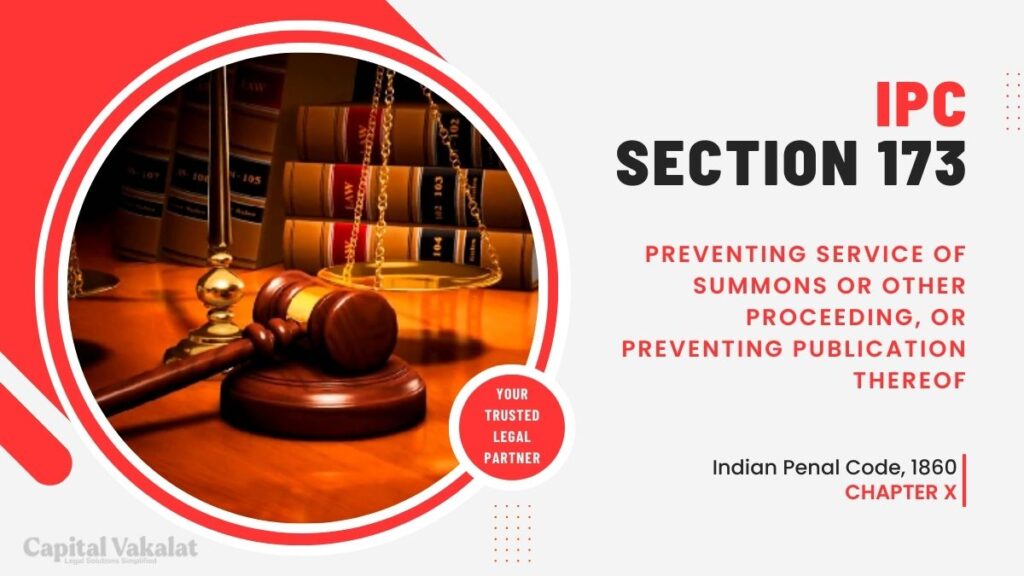In today’s legal landscape, Section 173 of the Indian Penal Code (IPC) plays a crucial role in ensuring the smooth functioning of the legal system. This article delves into the intricacies of Section 173 IPC, focusing on the prevention of service of summons or other legal proceedings and the prevention of their publication.

Understanding Section 173 IPC
Purpose and Scope
Section 173 of the IPC is designed to safeguard the integrity of legal proceedings. It specifically addresses situations where individuals attempt to evade or obstruct the service of summons or other legal notices. This section also extends to actions taken to prevent the publication of such notices.
Importance in Legal Proceedings
Section 173 IPC serves as a cornerstone in maintaining transparency and fairness within the legal system. By prohibiting interference with the service of legal documents, it ensures that legal proceedings can proceed without hindrance.
Offenses Under Section 173 IPC
Preventing Service of Summons
One of the primary offenses under Section 173 IPC is preventing the service of summons. This could involve actions such as hiding from process servers, providing false information, or using other means to avoid being served legal notices.
Preventing Publication of Summons
Preventing the publication of summons is another violation of this section. This includes efforts to suppress the dissemination of legal notices, which is essential for informing parties involved in legal proceedings.
Legal Implications
When someone is found guilty of violating Section 173 IPC, they may face serious legal consequences. These can range from fines to imprisonment, depending on the severity of the offense and its impact on legal proceedings.
Penalties and Consequences
The penalties for offenses under Section 173 IPC can vary, with the courts taking into account the specific circumstances of each case. These penalties may include fines, imprisonment, or both.
Notable Legal Cases
Several high-profile legal cases have revolved around Section 173 IPC violations. These cases have highlighted the significance of this section in ensuring justice is served and legal processes are respected.
Defenses Against Section 173 IPC Charges
Individuals facing charges under Section 173 IPC may have several legal defenses at their disposal. These defenses could revolve around establishing a lack of intent, procedural errors, or challenging the evidence presented.
The Significance of Service of Summons
Service of summons is a fundamental aspect of legal proceedings. It provides individuals with notice of legal actions against them, ensuring their right to defend themselves.
Role of Legal Professionals
Legal professionals, including lawyers and process servers, play a critical role in ensuring that Section 173 IPC is upheld. They are responsible for serving legal documents and ensuring their proper publication.
Combating Misuse of Section 173 IPC
While Section 173 IPC is essential for maintaining the sanctity of legal proceedings, it’s equally important to prevent its misuse. Legal safeguards and checks are in place to ensure that this section is not exploited to harass or intimidate individuals.
The Importance of Compliance
Understanding and adhering to Section 173 IPC is crucial for individuals, as non-compliance can lead to legal repercussions. Being aware of the law and cooperating with legal proceedings is vital for a just legal system.
Real-life Examples
To better understand the real-world implications of Section 173 IPC, consider a scenario where a defendant attempts to evade being served a summons, thereby delaying a legal process. Such actions can have significant consequences and disrupt the administration of justice.
Conclusion
In conclusion, Section 173 IPC plays a pivotal role in preserving the sanctity of legal proceedings by preventing the evasion of summons and the suppression of their publication. It upholds the principles of transparency, fairness, and justice within the legal system.
Frequently Asked Questions
What are the potential penalties for violating Section 173 IPC?
Penalties for Section 173 IPC violations can include fines, imprisonment, or both, depending on the circumstances of the offense.
How can one defend against Section 173 IPC charges?
Defenses against Section 173 IPC charges may involve establishing a lack of intent, procedural errors, or challenging the presented evidence.
What is the significance of the service of summons in legal proceedings?
The service of summons is crucial in legal proceedings, as it provides individuals with notice of legal actions against them, allowing them to defend themselves.
How can Section 173 IPC be prevented from being misused?
Section 173 IPC can be prevented from being misused through legal safeguards and checks that ensure it is not exploited to harass or intimidate individuals.